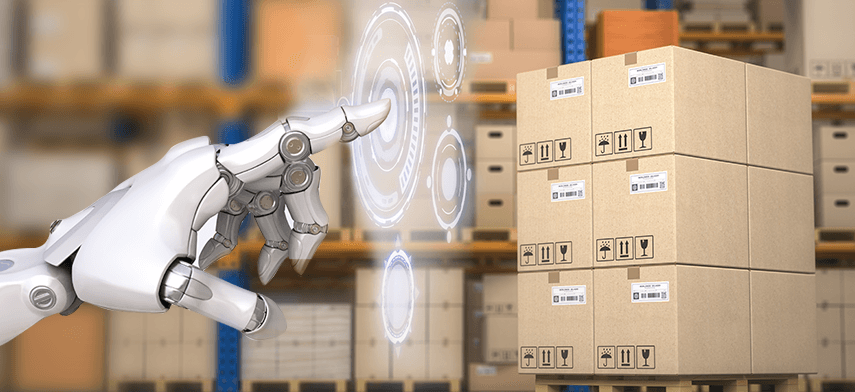home - The Future of Logistics: How AI is Revolutionizing the Industry
As the industry evolves, the integration of Artificial Intelligence (AI) is emerging as a game-changer.
In today's fast-paced world, logistics companies face an array of challenges, from rising customer expectations to increasing operational costs. As the industry evolves, the integration of Artificial Intelligence (AI) is emerging as a game-changer. AI is not merely a technological advancement; it is a transformative force that can streamline operations, enhance decision-making, and ultimately drive profitability. In this blog post, we will explore how AI is supporting logistics companies and how AI agents can automate work processes, making logistics operations more efficient and effective.

The Role of AI in Logistics
1. Supply Chain Optimization
One of the most significant advantages of AI in logistics is its ability to optimize supply chains. Traditional supply chain management often relies on historical data and manual processes, which can lead to inefficiencies. AI, on the other hand, utilizes advanced algorithms to analyze real-time data, forecast demand, and manage inventory levels.
For instance, AI can predict fluctuations in demand based on various factors such as seasonality, market trends, and consumer behavior. This predictive capability allows logistics companies to adjust their inventory accordingly, reducing excess stock and minimizing stockouts. By optimizing routes and delivery schedules, AI can also help companies save on fuel costs and improve delivery times, ultimately enhancing customer satisfaction.
2. Automated Warehousing
The rise of e-commerce has put immense pressure on logistics companies to fulfill orders quickly and accurately. AI-powered automation in warehousing is addressing this challenge head-on. Automated systems, including robots and conveyor belts, can handle tasks such as sorting, packing, and inventory management with remarkable speed and precision.
For example, AI-driven robots can navigate warehouses, picking items and preparing them for shipment without human intervention. This not only reduces labor costs but also minimizes the risk of human error, leading to more accurate order fulfillment. As a result, logistics companies can scale their operations to meet growing demand while maintaining high service levels.
3. Enhanced Customer Experience
In an age where customer experience is paramount, AI is playing a crucial role in improving service delivery. AI chatbots and virtual assistants are becoming increasingly common in logistics, providing customers with real-time information and support. These AI agents can handle inquiries, track shipments, and resolve issues around the clock, ensuring that customers receive timely assistance.
Moreover, AI can analyze customer feedback and behavior to personalize interactions, making customers feel valued and understood. By enhancing communication and responsiveness, logistics companies can build stronger relationships with their clients, leading to increased loyalty and repeat business.
4. Predictive Maintenance
Logistics companies rely heavily on vehicles and equipment, and any downtime can be costly. AI can help mitigate this risk through predictive maintenance. By analyzing data from sensors and monitoring equipment performance, AI systems can predict when maintenance is needed before a breakdown occurs.
For instance, if a delivery truck's engine shows signs of wear, AI can alert the maintenance team to address the issue proactively. This approach not only reduces unexpected downtime but also extends the lifespan of assets, resulting in significant cost savings for logistics companies.
5. Data-Driven Decision Making
The logistics industry generates vast amounts of data, and AI can help companies make sense of it all. By leveraging machine learning and data analytics, logistics firms can gain valuable insights into their operations. This data-driven approach enables companies to identify inefficiencies, optimize processes, and make informed decisions that enhance overall performance.
For example, AI can analyze shipping patterns to identify bottlenecks in the supply chain, allowing companies to implement targeted improvements. By harnessing the power of data, logistics companies can stay ahead of the competition and adapt to changing market conditions.

How Logistisa Can Help
At Logistisa, we understand that the logistics landscape is complex and ever-changing. Our mission is to empower logistics companies to thrive in this environment by leveraging the latest advancements in AI technology. With a team of experts dedicated to providing tailored solutions, we are well-equipped to help you navigate the challenges of the logistics industry.
Whether you are looking to optimize your supply chain, automate your warehousing processes, or enhance customer service, Logistisa has the expertise and resources to support your goals. Our innovative AI solutions are designed to streamline operations, reduce costs, and improve overall efficiency.
Contact Us
Are you ready to take your logistics operations to the next level with AI? Visit our website at www.logistisa.com to learn more about our services and discover how we can assist you in transforming your logistics processes. Our team is eager to partner with you to unlock new opportunities for growth and success.
Conclusion
The integration of AI in logistics is not just a trend; it is a necessity for companies looking to remain competitive in a rapidly evolving market. By automating processes and leveraging data, logistics companies can enhance efficiency, reduce costs, and improve customer satisfaction. At Logistisa, we are committed to helping you harness the power of AI to achieve your logistics goals. Contact us today to discover how we can support you in navigating the complexities of the logistics landscape and unlocking new avenues for growth. Together, we can build a future where your logistics operations are not only efficient but also resilient and responsive to the ever-changing demands of the market. Let Logistisa be your partner in this transformative journey.
No comments yet. Login to start a new discussion Start a new discussion